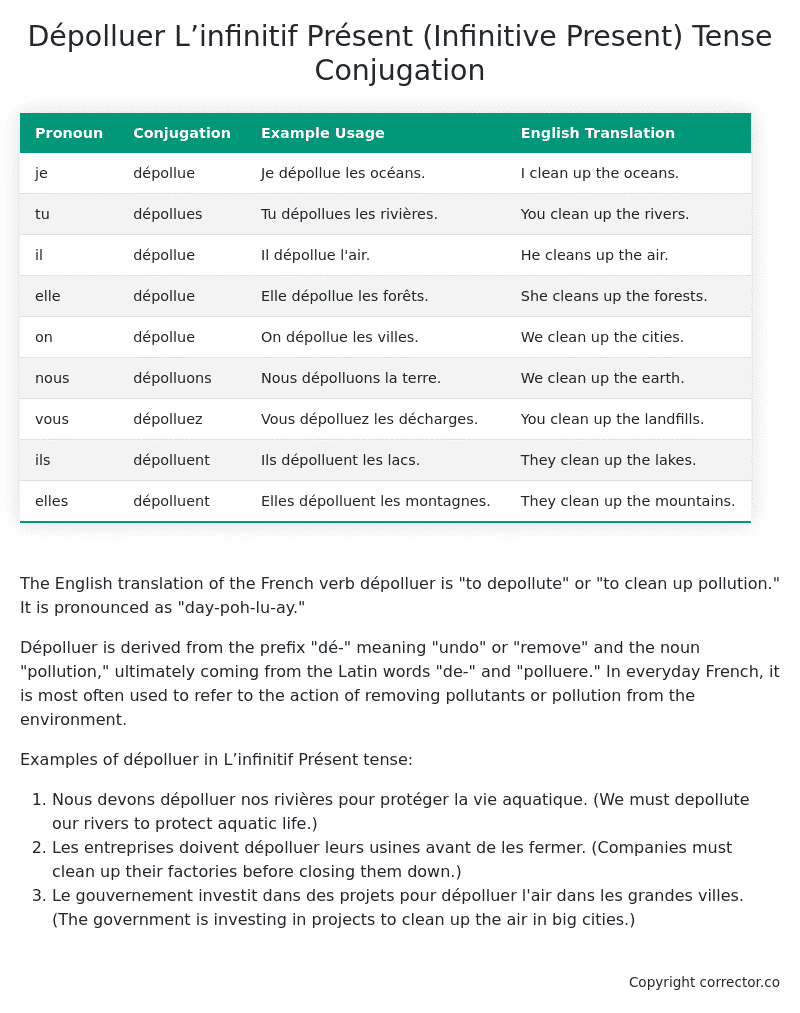L’infinitif Présent (Infinitive Present) Tense Conjugation of the French Verb dépolluer
Introduction to the verb dépolluer
The English translation of the French verb dépolluer is “to depollute” or “to clean up pollution.” It is pronounced as “day-poh-lu-ay.”
Dépolluer is derived from the prefix “dé-” meaning “undo” or “remove” and the noun “pollution,” ultimately coming from the Latin words “de-” and “polluere.” In everyday French, it is most often used to refer to the action of removing pollutants or pollution from the environment.
Examples of dépolluer in L’infinitif Présent tense:
- Nous devons dépolluer nos rivières pour protéger la vie aquatique. (We must depollute our rivers to protect aquatic life.)
- Les entreprises doivent dépolluer leurs usines avant de les fermer. (Companies must clean up their factories before closing them down.)
- Le gouvernement investit dans des projets pour dépolluer l’air dans les grandes villes. (The government is investing in projects to clean up the air in big cities.)
Table of the L’infinitif Présent (Infinitive Present) Tense Conjugation of dépolluer
| Pronoun | Conjugation | Example Usage | English Translation |
|---|---|---|---|
| je | dépollue | Je dépollue les océans. | I clean up the oceans. |
| tu | dépollues | Tu dépollues les rivières. | You clean up the rivers. |
| il | dépollue | Il dépollue l’air. | He cleans up the air. |
| elle | dépollue | Elle dépollue les forêts. | She cleans up the forests. |
| on | dépollue | On dépollue les villes. | We clean up the cities. |
| nous | dépolluons | Nous dépolluons la terre. | We clean up the earth. |
| vous | dépolluez | Vous dépolluez les décharges. | You clean up the landfills. |
| ils | dépolluent | Ils dépolluent les lacs. | They clean up the lakes. |
| elles | dépolluent | Elles dépolluent les montagnes. | They clean up the mountains. |
Other Conjugations for Dépolluer.
Le Present (Present Tense) Conjugation of the French Verb dépolluer
Imparfait (Imperfect) Tense Conjugation of the French Verb dépolluer
Passé Simple (Simple Past) Tense Conjugation of the French Verb dépolluer
Passé Composé (Present Perfect) Tense Conjugation of the French Verb dépolluer
Futur Simple (Simple Future) Tense Conjugation of the French Verb dépolluer
Futur Proche (Near Future) Tense Conjugation of the French Verb dépolluer
Plus-que-parfait (Pluperfect) Tense Conjugation of the French Verb dépolluer
Passé Antérieur (Past Anterior) Tense Conjugation of the French Verb dépolluer
Futur Antérieur (Future Anterior) Tense Conjugation of the French Verb dépolluer
Subjonctif Présent (Subjunctive Present) Tense Conjugation of the French Verb dépolluer
Subjonctif Passé (Subjunctive Past) Tense Conjugation of the French Verb dépolluer
Subjonctif Imparfait (Subjunctive Imperfect) Tense Conjugation of the French Verb dépolluer
Subjonctif Plus-que-parfait (Subjunctive Pluperfect) Tense Conjugation of the French Verb dépolluer
Conditionnel Présent (Conditional Present) Tense Conjugation of the French Verb dépolluer
Conditionnel Passé (Conditional Past) Tense Conjugation of the French Verb dépolluer
L’impératif Présent (Imperative Present) Tense Conjugation of the French Verb dépolluer
L’infinitif Présent (Infinitive Present) Tense Conjugation of the French Verb dépolluer (this article)
Struggling with French verbs or the language in general? Why not use our free French Grammar Checker – no registration required!
Get a FREE Download Study Sheet of this Conjugation 🔥
Simply right click the image below, click “save image” and get your free reference for the dépolluer L’infinitif Présent tense conjugation!

Dépolluer – About the French L’infinitif Présent (Infinitive Present) Tense
Forming the Infinitive Present
Common Everyday Usage Patterns
As a Verb’s Dictionary Form
After Modal Verbs
As an Imperative
In Infinitive Clauses
Interactions with Other Tenses
Present Tense
Future Tense
Conditional Tense
Passé Composé
Imperfect Tense
Subjunctive and Conditional Moods
Summary
Want More?
I hope you enjoyed this article on the verb dépolluer. Still in a learning mood? Check out another TOTALLY random French verb conjugation!


